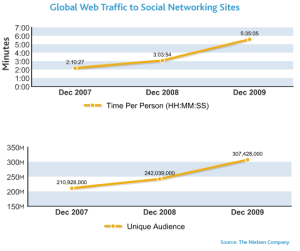Submitted by Kimberly Sarmiento, CPRW
Senior IT executives will tell you that having the right technology and a strong IT strategy is pivotal in today’s ever-changing high-tech marketplace. And rather your career search is global or local, your on-line efforts are just as important.
However, while IT is an important aspect of any company, there are plenty of other business functions – like Human Resources and Sales & Marketing – which would vie for top priority in making an organization a success. The truth is they are all instrumental parts of the whole, working together to optimize revenue and profitability. Likewise, your career search must incorporate many elements to be truly successful and maximize returns.
Your IT Strategy:
Besides posting a résumé on job sites, maintain a professional networking page on a website like LinkedIn. While your LinkedIn page contains much of the same information as your résumé, it should be different in tone and verbiage. After all, if you submit your résumé to a company, you don’t want them feeling like they’ve seen all this information before when they review your LinkedIn page or vice versa. Having the content of your profile page professional prepared by a trained résumé writer might be one way to maximize your on-line presence. If you are unable to secure the help of a professional writer, throw a few ideas our way and we will offer insight and guidance.
Your Human Resources Tactics:
Personal contact is key to networking success as well as getting your foot in the door for interviews. Do NOT be afraid to pick up the phone and introduce yourself to a prospective hiring authority or professional contact. Asking for informational interviews is one way to expand your contacts and place yourself on an employer’s radar. Also after sending a decision maker your résumé, connecting with them by phone is very important. On a side note, always use business etiquette because this will help you cement a positive impression.
Your Sales & Marketing Campaign:
A solid résumé and cover letter is your method of promoting yourself to hiring authorities. Making sure your documents are error free and convey your value with powerful, active-voice language will position you ahead of your competition. Having a professional résumé writer or your career services department review and/or prepare your documents is like having a professional advertising company prepare a marketing campaign. You want to hit your audience with the best material possible to make them pick up that phone and call you.
Effective career marketing is more effective under a collaborative approach. For the student, don’t hesitate to contact your career services professionals. For those who have been in the workforce (as well as those entering the workforce), consider securing an expert in the field. If you have any questions or would like me to quickly review your material, give me a shout-out.
Thank you Kimberly, your wisdom is always appreciated.
dhuffman
EducationCS.com
407-206-5883








